The Intel Skylake-X Review: Core i9 7900X, i7 7820X and i7 7800X Tested
by Ian Cutress on June 19, 2017 9:01 AM ESTBenchmarking Performance: CPU Encoding Tests
One of the interesting elements on modern processors is encoding performance. This includes encryption/decryption, as well as video transcoding from one video format to another. In the encrypt/decrypt scenario, this remains pertinent to on-the-fly encryption of sensitive data - a process by which more modern devices are leaning to for software security. Video transcoding as a tool to adjust the quality, file size and resolution of a video file has boomed in recent years, such as providing the optimum video for devices before consumption, or for game streamers who are wanting to upload the output from their video camera in real-time. As we move into live 3D video, this task will only get more strenuous, and it turns out that the performance of certain algorithms is a function of the input/output of the content.
HandBrake H264 and HEVC
As mentioned above, video transcoding (both encode and decode) is a hot topic in performance metrics as more and more content is being created. First consideration is the standard in which the video is encoded, which can be lossless or lossy, trade performance for file-size, trade quality for file-size, or all of the above can increase encoding rates to help accelerate decoding rates. Alongside Google's favorite codec, VP9, there are two others that are taking hold: H264, the older codec, is practically everywhere and is designed to be optimized for 1080p video, and HEVC (or H265) that is aimed to provide the same quality as H264 but at a lower file-size (or better quality for the same size). HEVC is important as 4K is streamed over the air, meaning less bits need to be transferred for the same quality content.
Handbrake is a favored tool for transcoding, and so our test regime takes care of three areas.
Low Quality/Resolution H264: He we transcode a 640x266 H264 rip of a 2 hour film, and change the encoding from Main profile to High profile, using the very-fast preset.
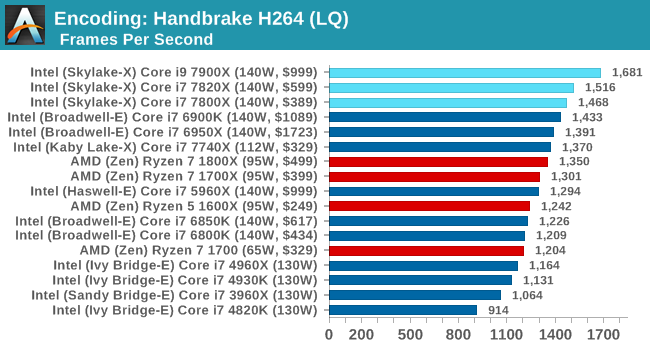
More cores, more frequency, more IPC, more fun: the Core i9-7900X wins here, and even the i7-7800X wins out against the Core i7-6900K.
High Quality/Resolution H264: A similar test, but this time we take a ten-minute double 4K (3840x4320) file running at 60 Hz and transcode from Main to High, using the very-fast preset.
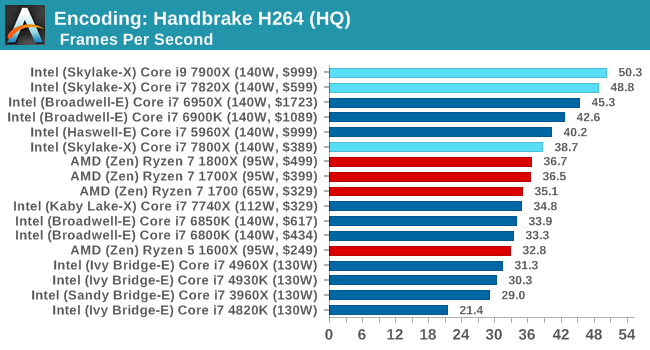
Moving into HQ mode means making the job more parallel, so the higher core counts stay at the top of the chart.
HEVC Test: Using the same video in HQ, we change the resolution and codec of the original video from 4K60 in H264 into 4K60 HEVC.
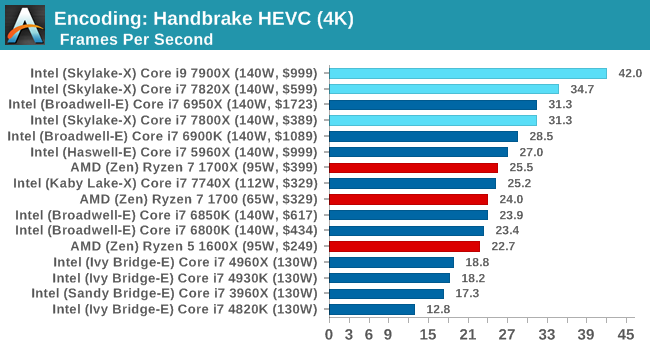
WinRAR 5.40
For the 2017 test suite, we move to the latest version of WinRAR in our compression test. WinRAR in some quarters is more user friendly that 7-Zip, hence its inclusion. Rather than use a benchmark mode as we did with 7-Zip, here we take a set of files representative of a generic stack (33 video files in 1.37 GB, 2834 smaller website files in 370 folders in 150 MB) of compressible and incompressible formats. The results shown are the time taken to encode the file. Due to DRAM caching, we run the test 10 times and take the average of the last five runs when the benchmark is in a steady state.
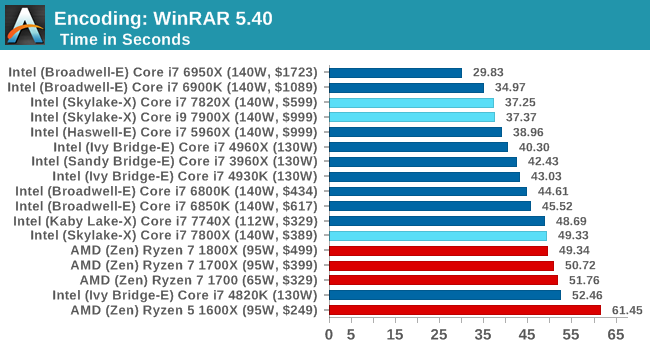
WinRAR loves having access to all the caches as much as possible, to prefetch and store data as needed. The Skylake-X chips fall back a bit here, even with DDR4-2666 support. The Core i7-7800X uses DDR4-2400 memory, so puts it further behind. Interesting didn't realise that the lower core count Broadwell-E chips were affected so much by this test, and the higher core count Ivy Bridge-E parts are faster here.
AES Encoding
Algorithms using AES coding have spread far and wide as a ubiquitous tool for encryption. Again, this is another CPU limited test, and modern CPUs have special AES pathways to accelerate their performance. We often see scaling in both frequency and cores with this benchmark. We use the latest version of TrueCrypt and run its benchmark mode over 1GB of in-DRAM data. Results shown are the GB/s average of encryption and decryption.
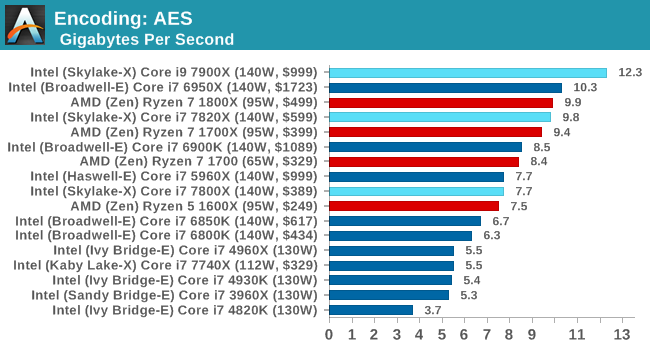
7-Zip
One of the freeware compression tools that offers good scaling performance between processors is 7-Zip. It runs under an open-source licence, is fast, and easy to use tool for power users. We run the benchmark mode via the command line for four loops and take the output score.
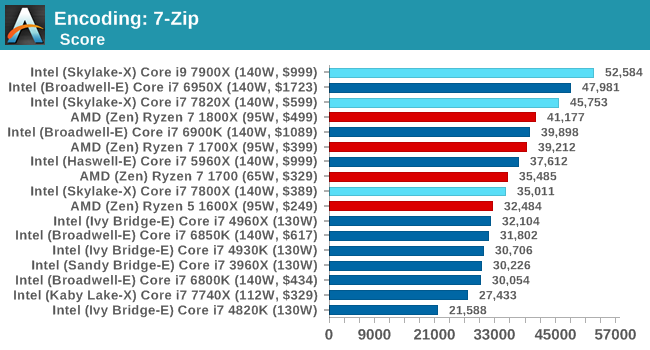










264 Comments
View All Comments
AnandTechReader2017 - Tuesday, June 20, 2017 - link
The Chill feature for AMD would probably be amazing for a mini-ITX build. Still waiting on AMD to launch dedicated graphics cards for laptops with it, would be amazing.I hope Nvidia comes up with a similar feature, would make gaming on laptops a lot nicer/quieter.
rocky12345 - Monday, June 19, 2017 - link
"As the first new serious entry into the HEDT space for AMD in almost five years, along with a new x86 core, AMD offered similar-ish performance to Broadwell-E in many aspects (within a few percent), but at half the price or better."Half right it was AMD's first serious entry into High end Mainstream Desktop in five years. We have not seem AMD's HEDT platform in action yet since it has not been released yet. With that said I was surprised how AMD's current Mainstream R7's were able to compete with Intels new HEDT platform so well. If this is what we are to expect from AMD's actual HEDT platform Intel will have a fight on their hands for sure.
I hope when AMD releases their Threadripper platform we get just as an extensive review for that as well. To me it is a lot more exciting to see x399 and threadripper in action than the x299 since Intel has been doing their HEDT platform for many years now and this will be the first time AMD has entered into the same Extreme high end space as Intel at the consumer level hardware.
Manch - Tuesday, June 20, 2017 - link
HEMD? LOLRyzen is a great chip no doubt. AMD is once again pushing Intel to iterate vs stagnate. AMD offers a great price/perf proc. But, AMD brought the comparison on themselves. Most previews were not against a 6700K or 7700K but against Intel's HEDT procs which AMD was clearly targeting with the pre-release benchmark comparos. It is not unfair to compare them.
Braincruser - Monday, June 19, 2017 - link
Any particular reason the mainstream intel processors are not in the benchmarks? One of the more important measurements for me is the difference between the mainstream and high end platforms.Ryan Smith - Monday, June 19, 2017 - link
While we technically have infinite space, we try not to overload the graphs with too many products, focusing on new products and certain generational comparisons. For specific comparisons you'd like to see that aren't in a graph, you can find all of that over in Bench.http://www.anandtech.com/bench/
AnandTechReader2017 - Tuesday, June 20, 2017 - link
Thanks for the link, I didn't know you guys had that.none12345 - Monday, June 19, 2017 - link
Small correction for your article, ryzen 7 has 20 pci lanes not 16. I am NOT counting 4 more for the chipset, if you count those its 24. Youve got 16 to the gpu, and 4 to a direct connected m.2(or 2 sata ports, but usually its a m.2)Tho thats not the whole story. Since technically you dont need the chipset, so you could connect something else instead on those 4 lanes. In the real world tho almost every motherboard will have a chipset there.
And then there are the usb ports which have direct connections on the chip as well. Thats could be counted as more pci lanes if one wanted to. They dont share the chipset link.
So depending on how you count it, its 20, 24, or 28 lanes. I would call it 20 and not count the usb or the chipset ones, but id definitly count the direct connected m.2
Nintendo Maniac 64 - Monday, June 19, 2017 - link
Uhhh, where's the results for Dolphin? It's on the "clock-for-clock" page but not on the "CPU system tests" page...Ro_Ja - Monday, June 19, 2017 - link
It's nice to see the Ryzen Chips keeping up with i9s.Hurr Durr - Tuesday, June 20, 2017 - link
Except they don`t, hence the price difference.